Eurasian Cultural Alliance Public Association
Republic of Kazakhstan, Almaty
Nurmakov str, 79
For all inquires please contact vladislavsludskiy@gmail.com
Republic of Kazakhstan, Almaty
Nurmakov str, 79
For all inquires please contact vladislavsludskiy@gmail.com
October 16th, 2020 — November 2nd, 2020
Food for Thought
Esentai Gourmet
OCTOBER 16TH, 2020 — NOVEMBER 2ND, 2020
Food for Thought
Esentai Gourmet
Curators: Olga Vesselova, Vladislav Sludskiy
Artists:
Yelena Vorobyova and Viktor Vorobyov, Moldakul Narymbetov, Zoya Falkova, Anvar Musrepov, TAKE OFF YOUR ELBOWS Art Group, Aisulu Shaikenova, Marina Gafurova, Balnura Nusipova, Aida Adilbek, Muratbek Turbay, Bakhyt Bubikanova, Daria Temirkhan, Fatima Omir, Violetta Bogdanova, Bauyrzhan Sabitov, LITERAL ACTION Inclusive Theater Lab, Lyazzat Khanim, Valery Ruppel
The new reality started on November 17, 2019, and it celebrated reinterpretation of public spaces. The meeting point for people and city has shifted from parks, museums and theaters to streets and supermarkets. At the intersection of these new and old public spaces the two vital human needs are ironically intertwined: on the one hand we cannot live without food and walling, on the other hand we cannot survive without culture and art.
Following the new rules of etiquette and guidelines the Eurasian Cultural Alliance in cooperation with Esentai Gourmet organized a contemporary art exhibition in a grocery store – it is a location unable to gather people under other circumstances. 13 artists and 1 theater make art in one way or another related to food, consumption, branding and, of course, the pandemic. The exhibition is a part of a series of cultural initiatives dedicated to the 10th anniversary of ARTBAT FEST contemporary art festival with the support of CEC ArtsLink.
Performances on October 16, 2020
19:00 — 19:45
Babylonian Shopping by Literal Action
19:30 – 20:00
The Sower by Bakhyt Bubikanova
20:15 – 21:00
Babylonian Shopping by Literal Action
Yelena Vorobyova and Viktor Vorobyov
Mad Tea Party, 2004
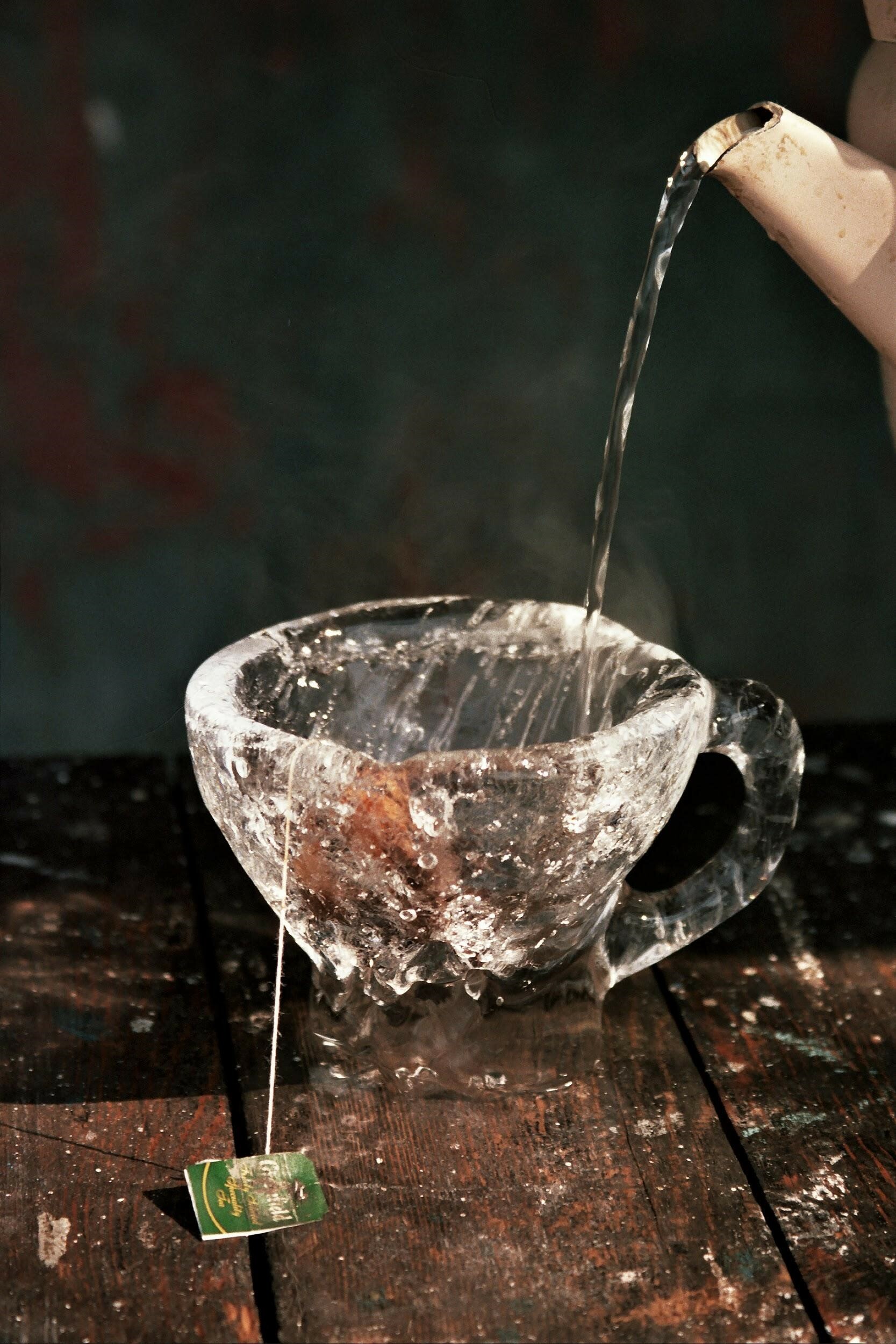
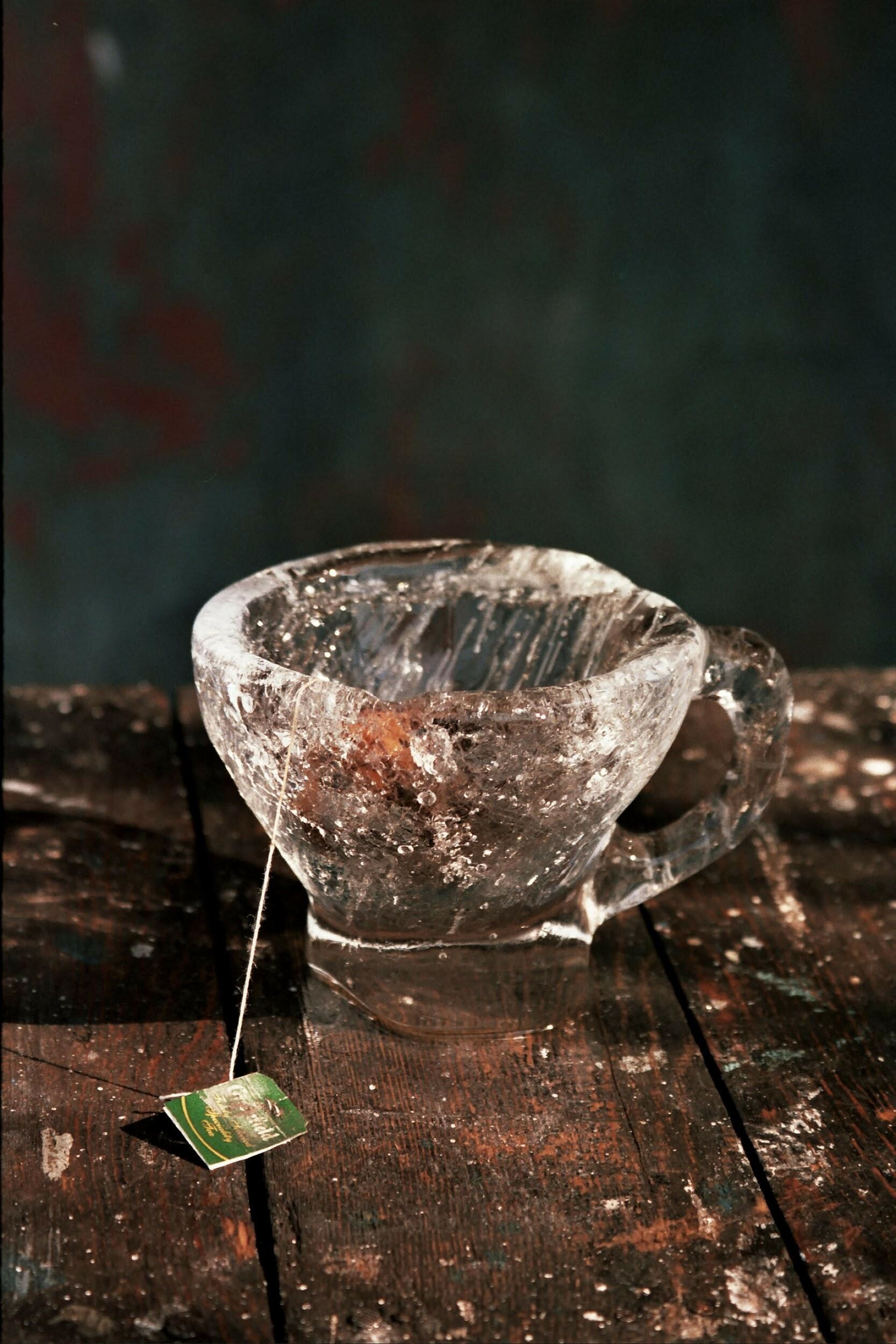
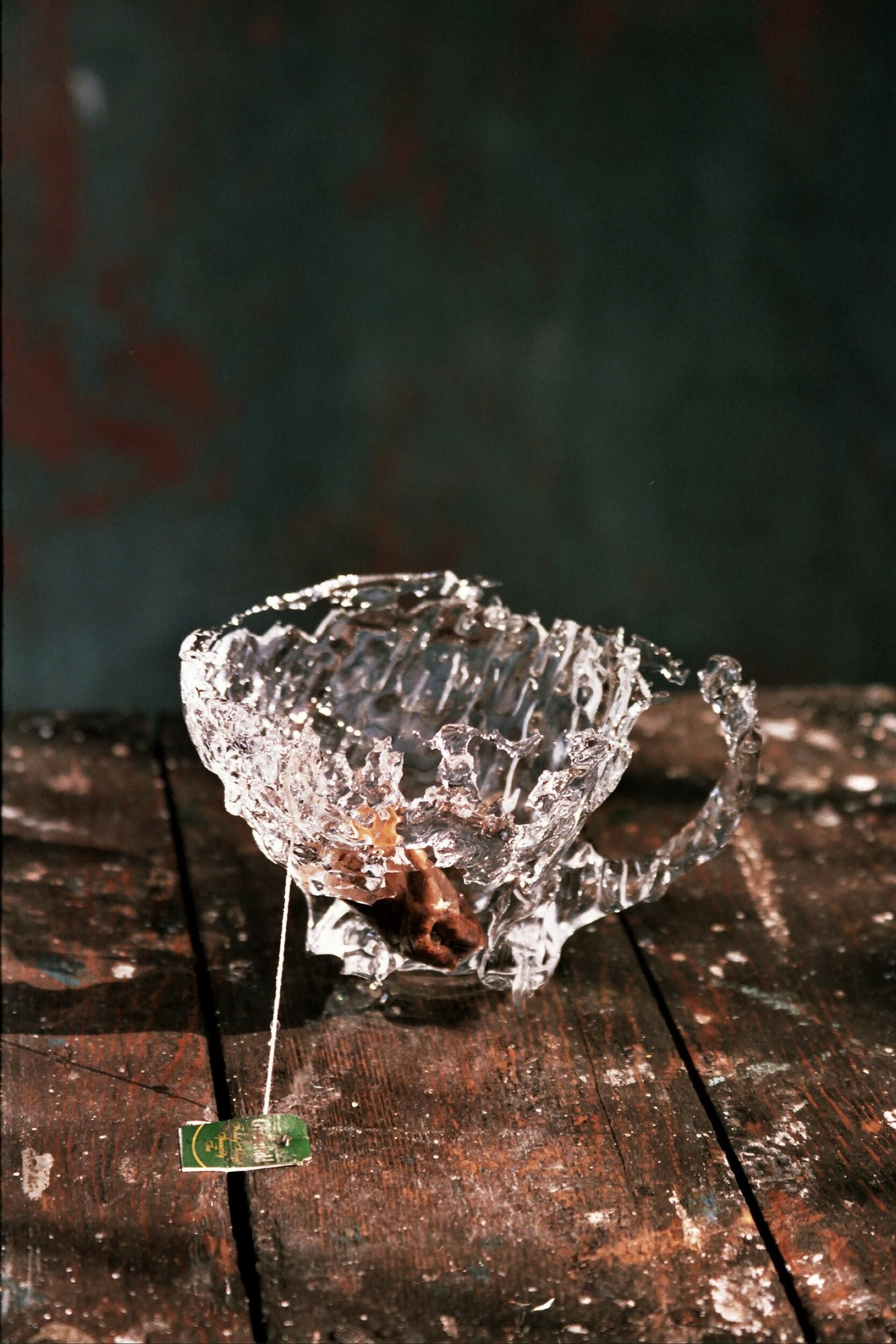
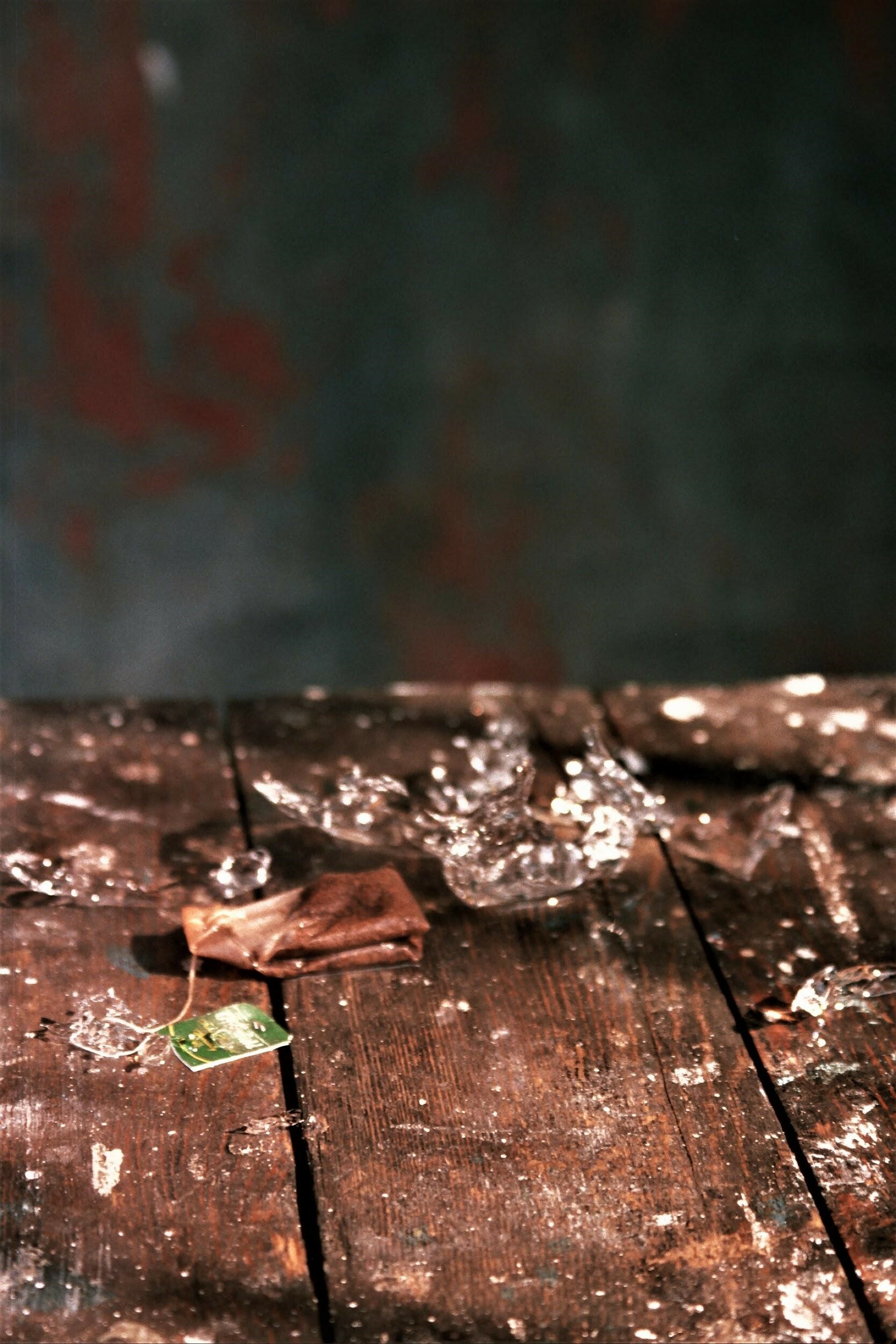
Glossy photo prints
4 panels
120 х 80 cm each panel
Copy 1of 5 +1 AP
4 panels
120 х 80 cm each panel
Copy 1of 5 +1 AP
Mad Tea Party is an act of creation through the act of dissolution: the boiling water is poured into a cup of ice, and the tea is never served. The experiment is recorded with a camera and afterwards this supposedly kill-time activity becomes a part of the history of art. The Vorobyovs have already practiced such storyboards of life in their works The Rapid Creation of Autumn (2001), the Winter Sublimating Object (2004), and a few others with an intense desire to blur the line between the material and the spiritual. Probably the artists are exploring the ritual as a phenomenon that connects the routine of daily affairs (ironing clothes, putting on a kettle, drinking tea) and art as an occasional manifestation of life.
Lyazzat Khanim
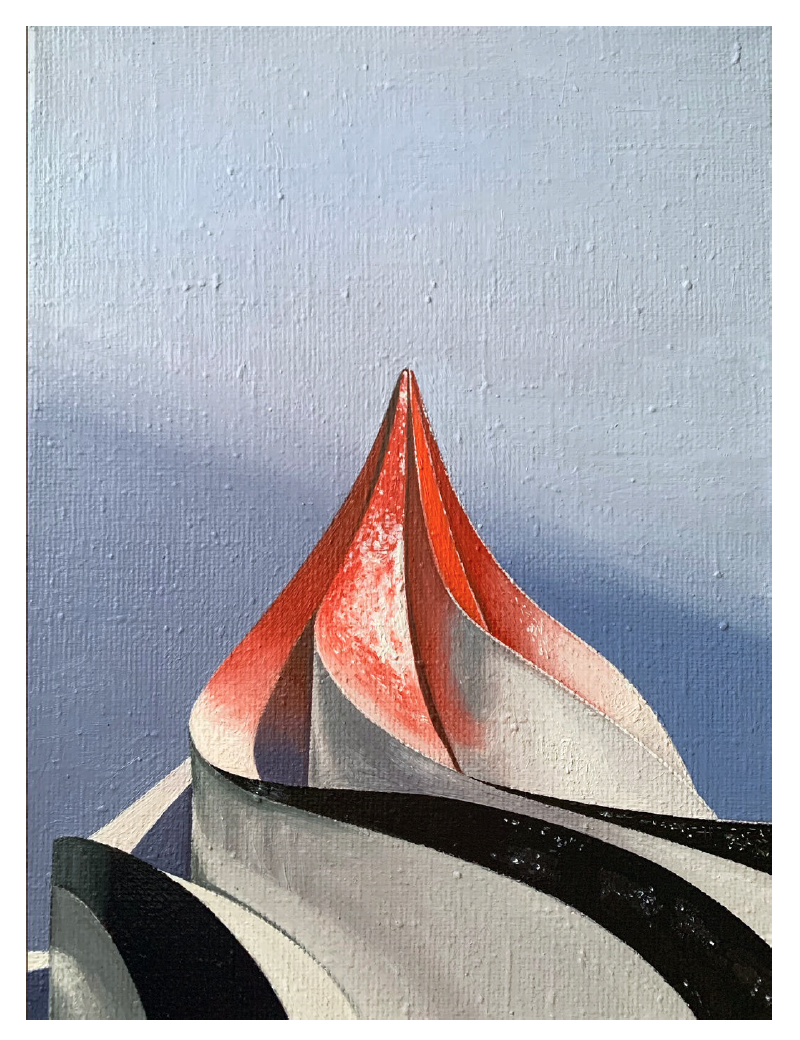
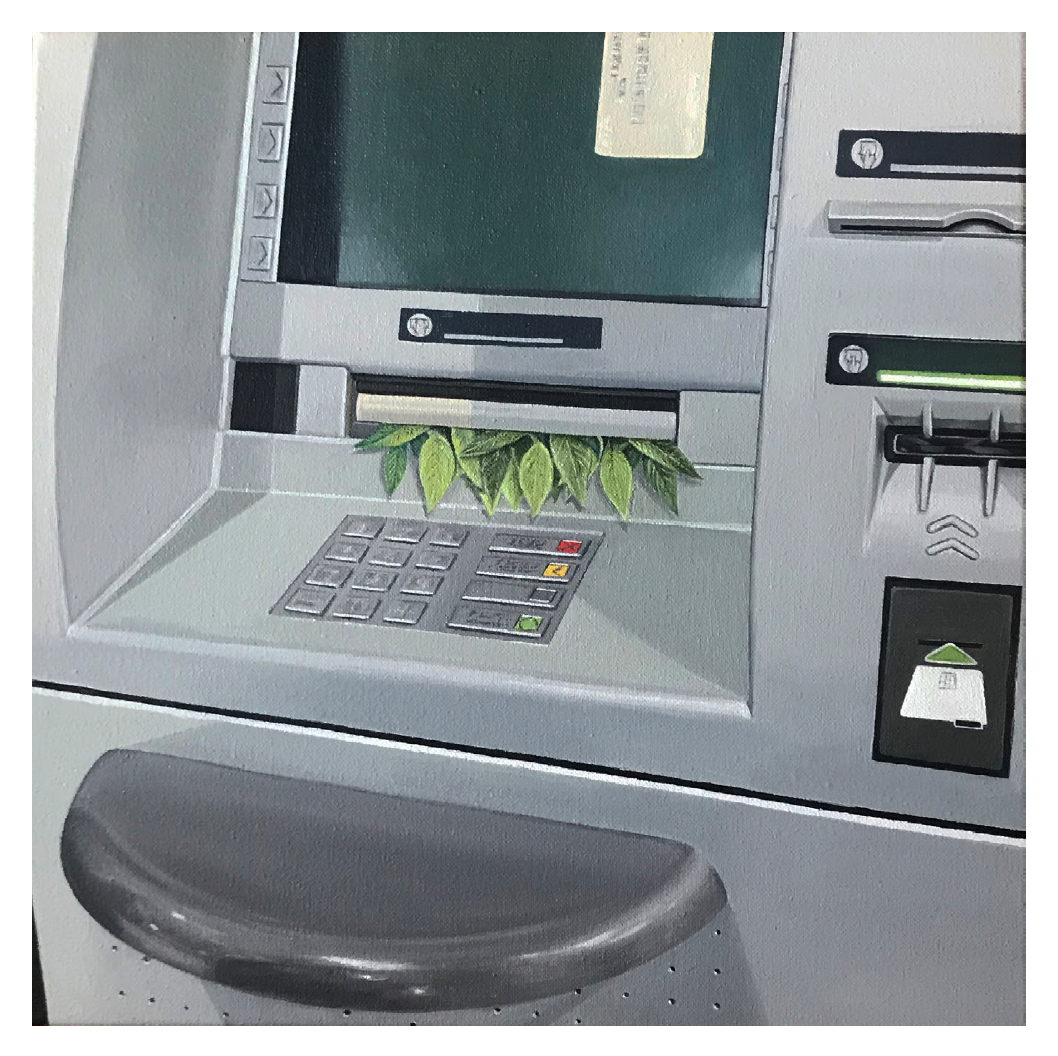

The hyperrealism of these paintings draws the viewer's attention to the texture of our reality, to the strange anxiety hidden in ordinary things and situations. The usual course of life was suddenly interrupted by an unexpected detail; it caught the artist's eyes, and in an instant it is impossible to look at familiar objects as we used to do before.
Violetta Bogdanova
Not on Purpose, 2020
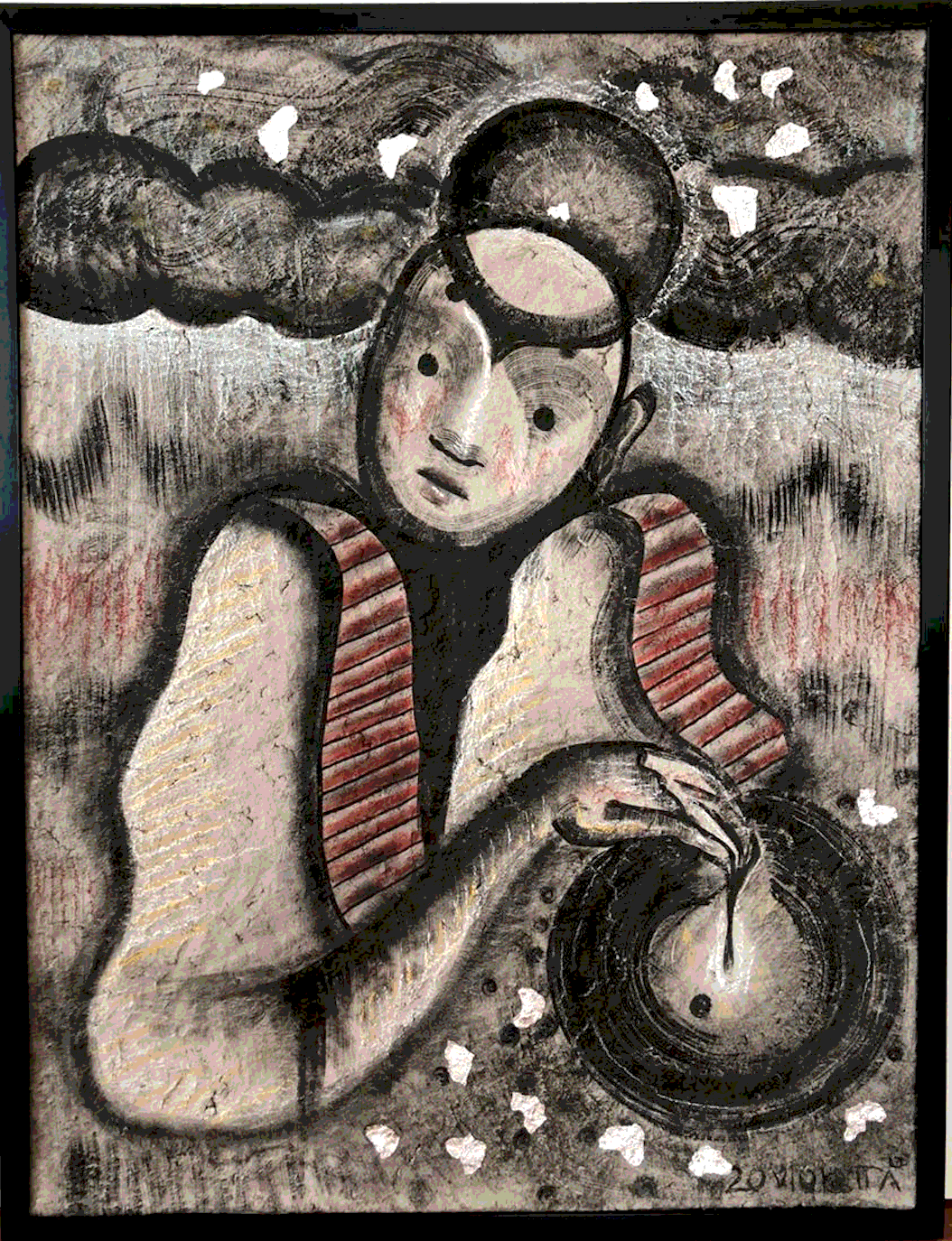
MDF, toilet paper, foil, ink, pastel, poppy seed
105 х 80 cm
105 х 80 cm
This piece of figurative art is made with necessity goods, the demand for which increased rapidly in the first weeks of the pandemic. Toilet paper and cereals are utilized not on purpose, and it is violating the contemporary reasoning capability of efficiency and rationality. The capitalist machine often forces us to feel fomo (fear of missing out), and today the society lives with a harsh taste of anxiety from a constant inability to meet the admitted standards of success.
Anvar Musrepov
Eating Ram's Head, 2017
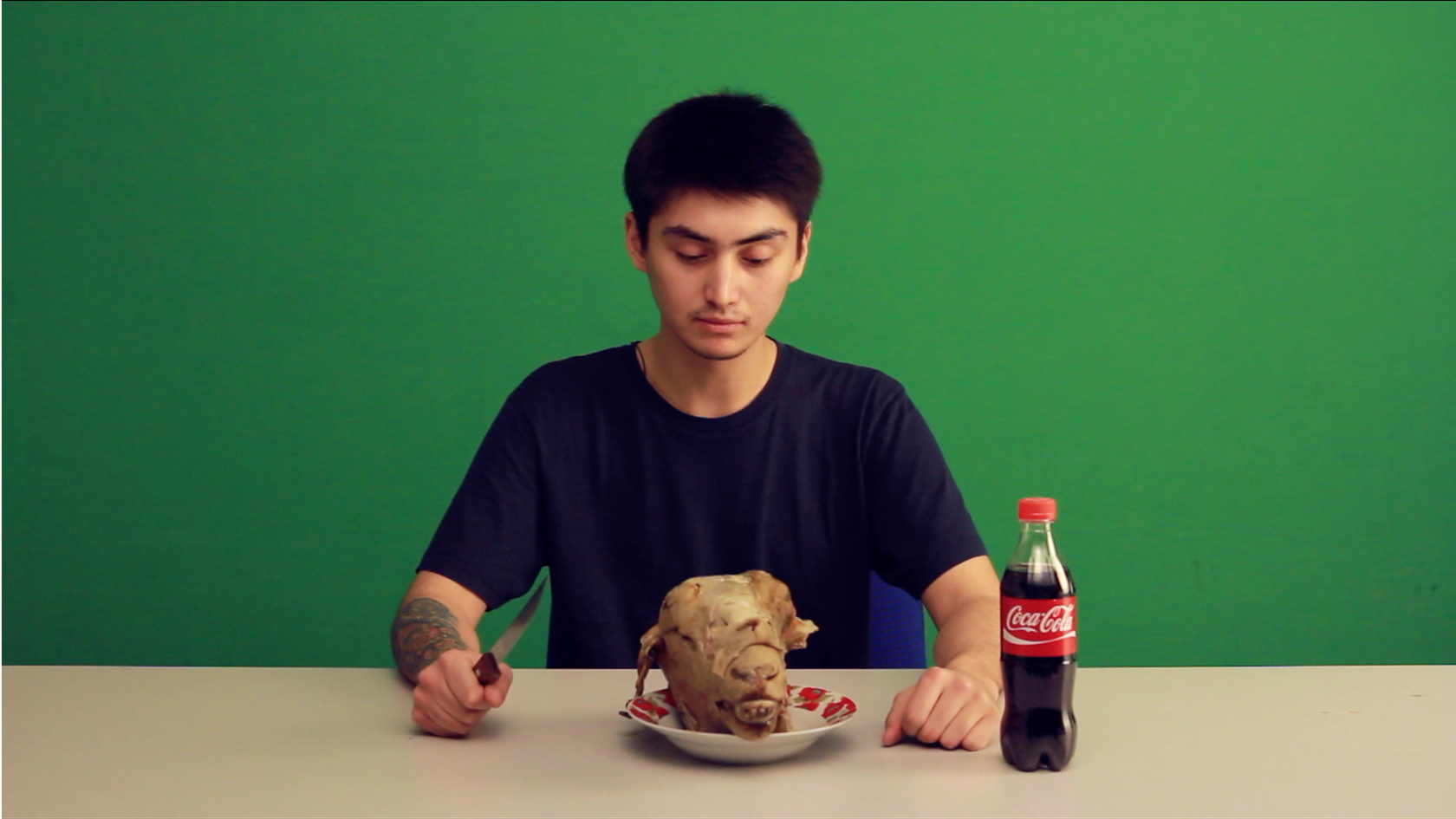
Video
duration: 5 min 27 sec
duration: 5 min 27 sec
Andy Warhol, the American artist and the King of Pop Art, made a famous video where he was eating a hamburger for 5 minutes and washed it down with Coca-Cola, it turned them into the symbols of the American way of life. Young artist Musrepov does the same replacing the burger with a ram's head of but keeping Coca-Cola in shot. With the opening of markets in the 1990s globalization got mixed with national traditions, and one has amusingly grown into the other, not always replacing it. Musrepov also leaves green screen background emphasizing how much the real essence of such actions is subject to media activity, as well as how brands are localized for a certain environment, and how this environment changes the brands.
Moldakul Narymbetov
Dzhut, 2001
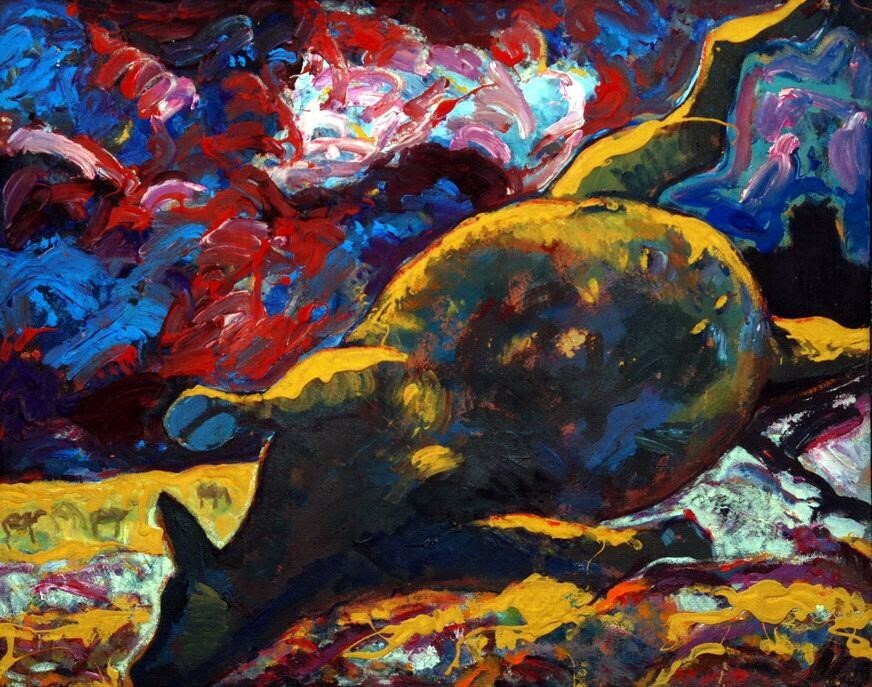
Acrylic on MDF, rubber
110 x 138 cm
110 x 138 cm
Narymbetov dedicated his canvas to the difficult theme of the dzhut (famine) in Kazakhstan, which was caused by the collectivization policy in the late 20s and early 30s. At that time people of Kazakhstan were forced to drastically change their nomadic way of life to a sedentary life. As a result of this foolish policy livestock and food supplies declined killing nearly a million people (some estimates count more than two million). In the center of the picture there is a dead cow, in the background there are silhouettes of camels and a dark-red sunset with deep dark tones of blue, as heavy as that time in the history of Kazakhstan.
Zoya Falkova
Rare, 2019-2020
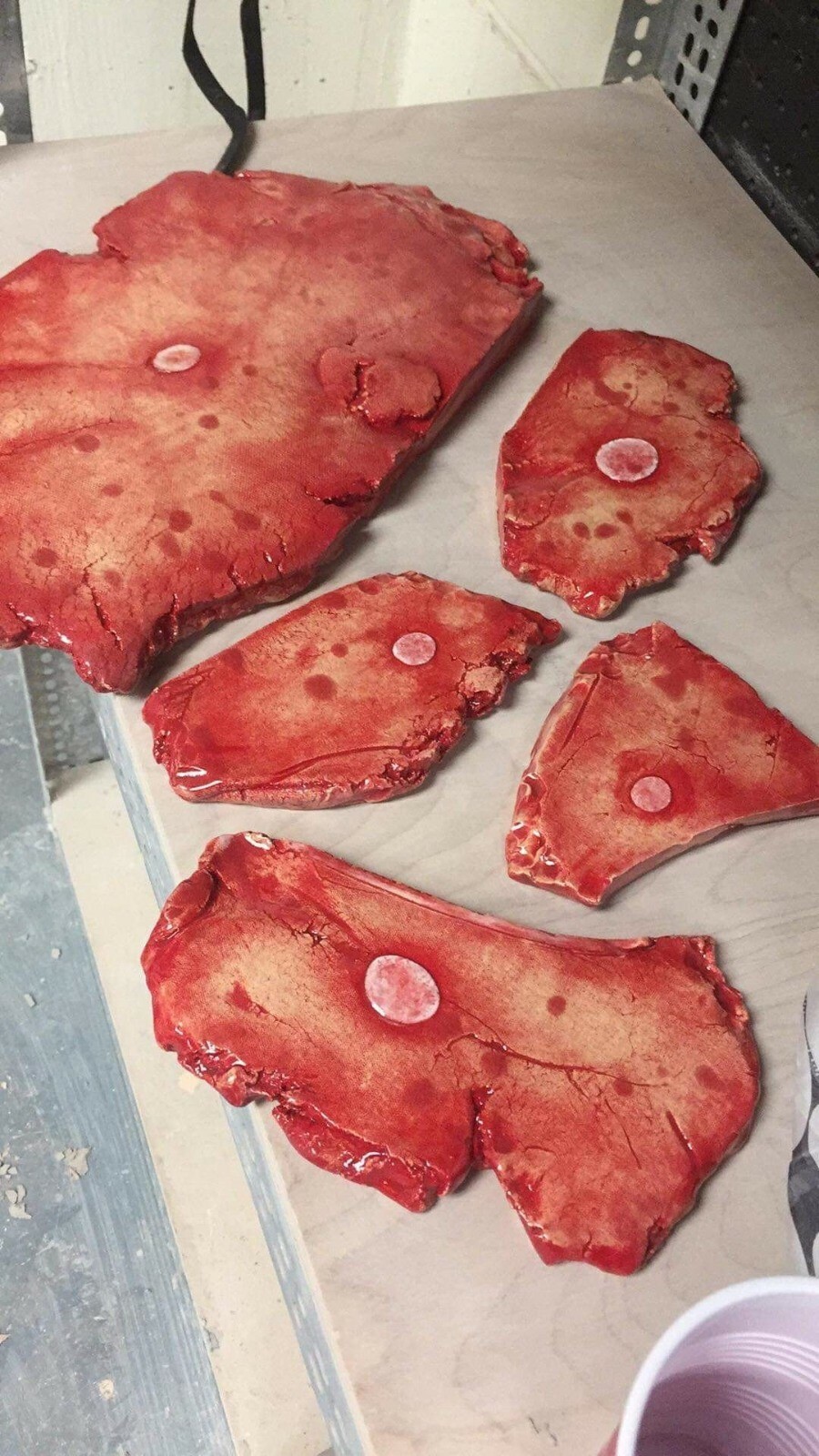
ceramics, pigment, glaze
dimensions variable
dimensions variable
The ceramic steaks are extremely honest, both in terms of their manufacturing process (we can see traces of the fabric used to roll the clay), and in terms of the criteria of beauty and capability that are usually applied to ceramic objects. This is a conversation about the aesthetics, purpose and 'artificiality' of art.
Falkova often works with biomaterials such as ants, cereals, meat and plants. These steaks are a kind of inversion of her language and alternatively in this series she makes something nonliving (ceramics) pretend to be living (meat).
Falkova often works with biomaterials such as ants, cereals, meat and plants. These steaks are a kind of inversion of her language and alternatively in this series she makes something nonliving (ceramics) pretend to be living (meat).
TAKE OFF YOUR ELBOWS Art Group
(Irina Dmitrovskaya and Veronika Trishina)
(Irina Dmitrovskaya and Veronika Trishina)
After Party, 2020
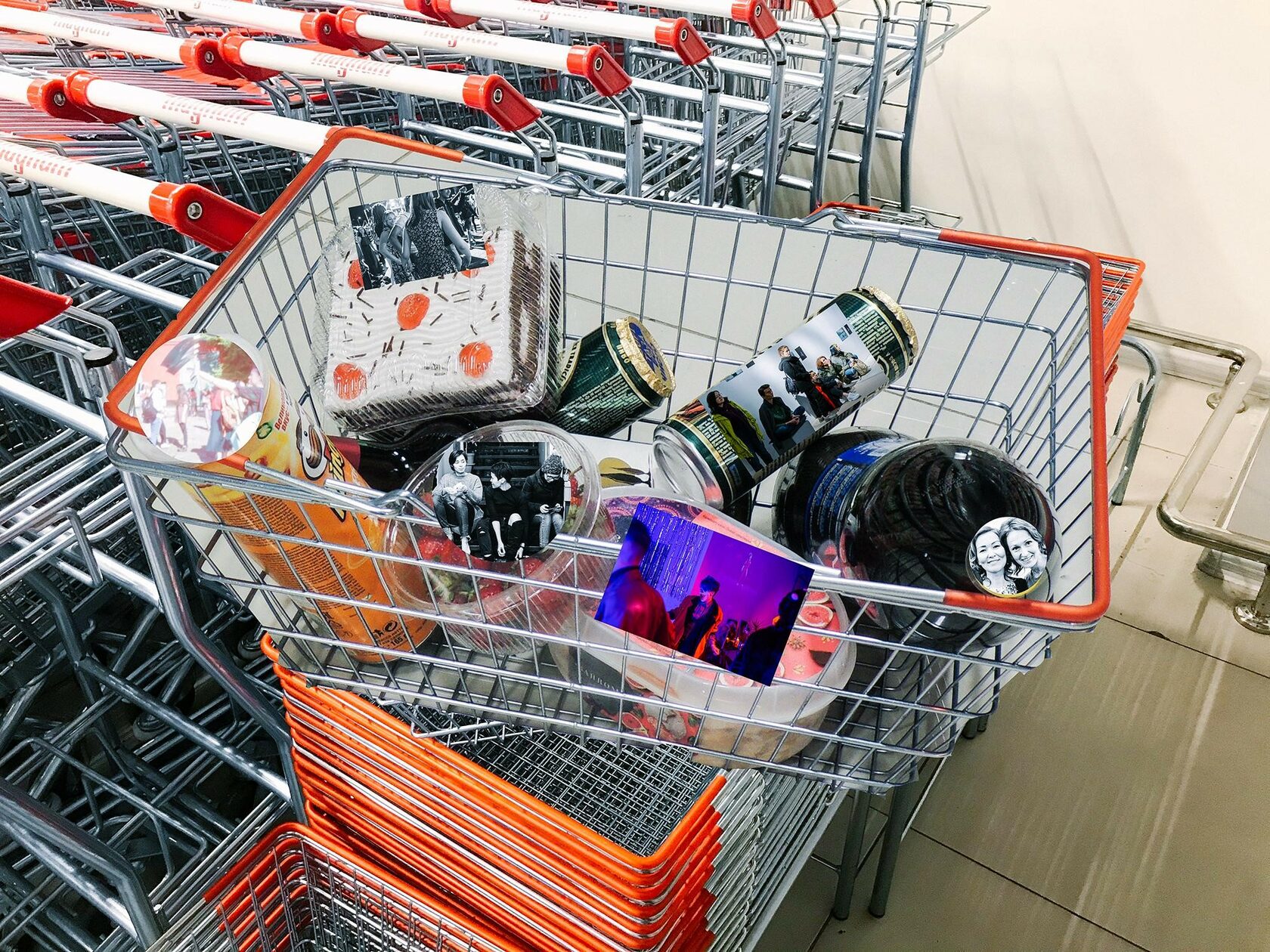
Object and photoprint
dimensions variable
dimensions variable
The artists replaced the product labels with photographs of people taken before the pandemic. This archive is located on products inside a conventional market basket full of everything for the party. This artwork deals with nostalgia for socialization, the impossibility of touching and the absence of hugs.
Aisulu Shaikenova
Cradle, 2020
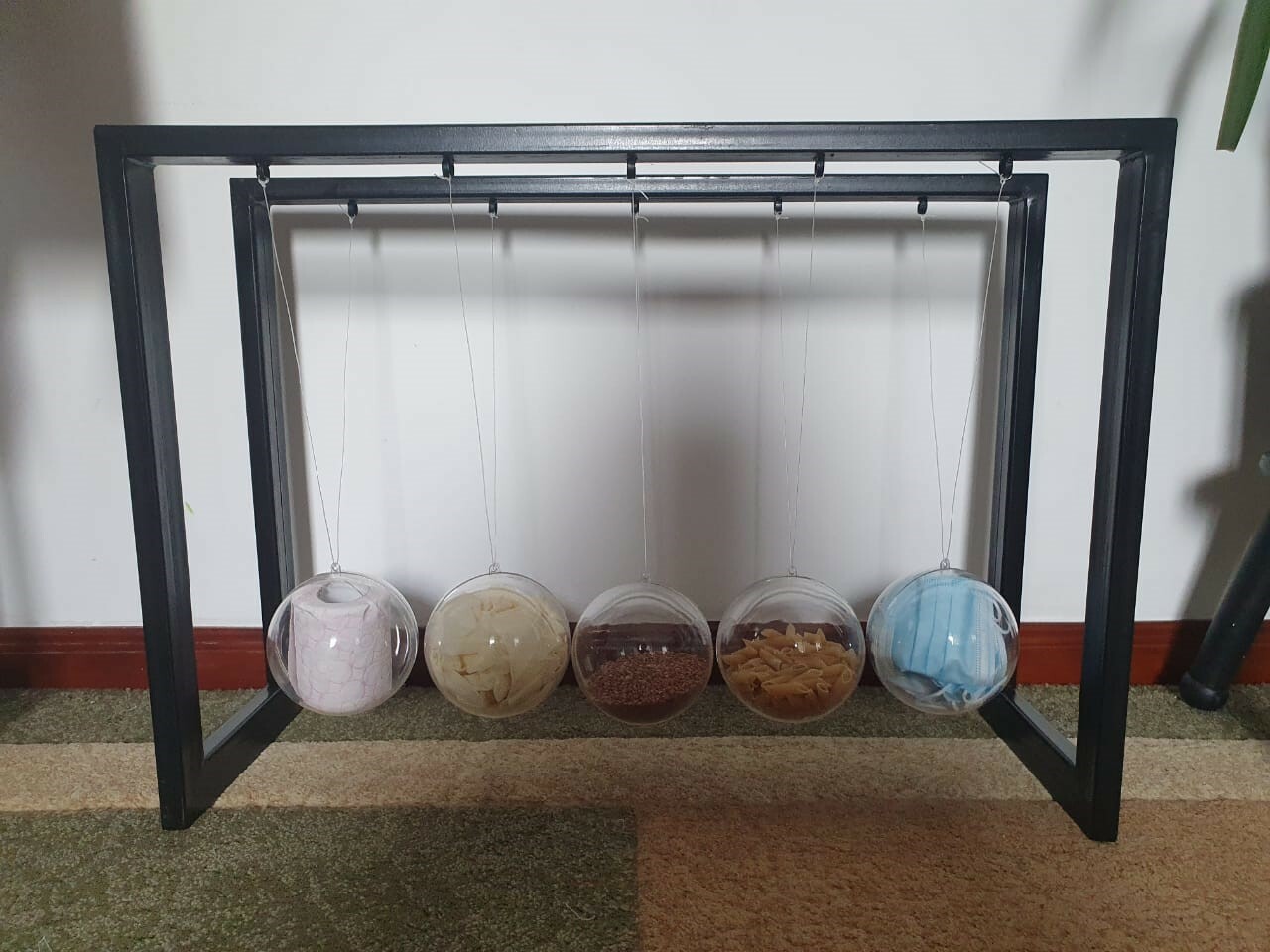
50 х 70 cm
Ready-mades, iron construction, fishing line, plastic
Ready-mades, iron construction, fishing line, plastic
Newton's Cradle is one of the simplest and the most well-known devices in psychology designed to relieve stress. During the quarantine many companies and enterprises were banned from working, and people were in crisis. The compensation offered was focused on basic necessities. Observing the behavior of people during the first wave of quarantine, Shaikenova noticed the calming effect of such goods as buckwheat, toilet paper, pasta, face masks and rubber gloves.
Marina Gafurova
The benchmark analysis of contemporary art in developed countries
(Kosuth, Warhol, Rauschenberg), 2020
(Kosuth, Warhol, Rauschenberg), 2020
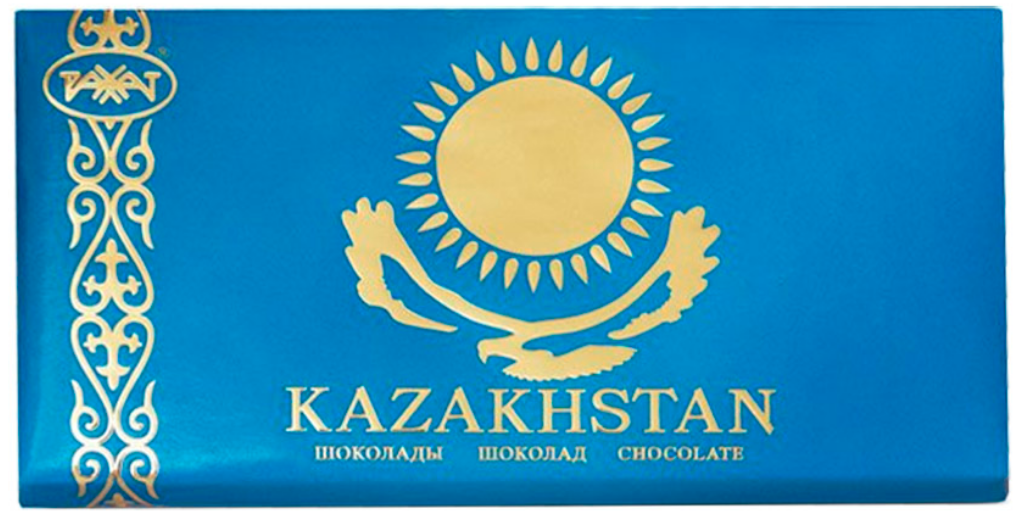
Photo printing, acrylic
Dimensions variable
Dimensions variable
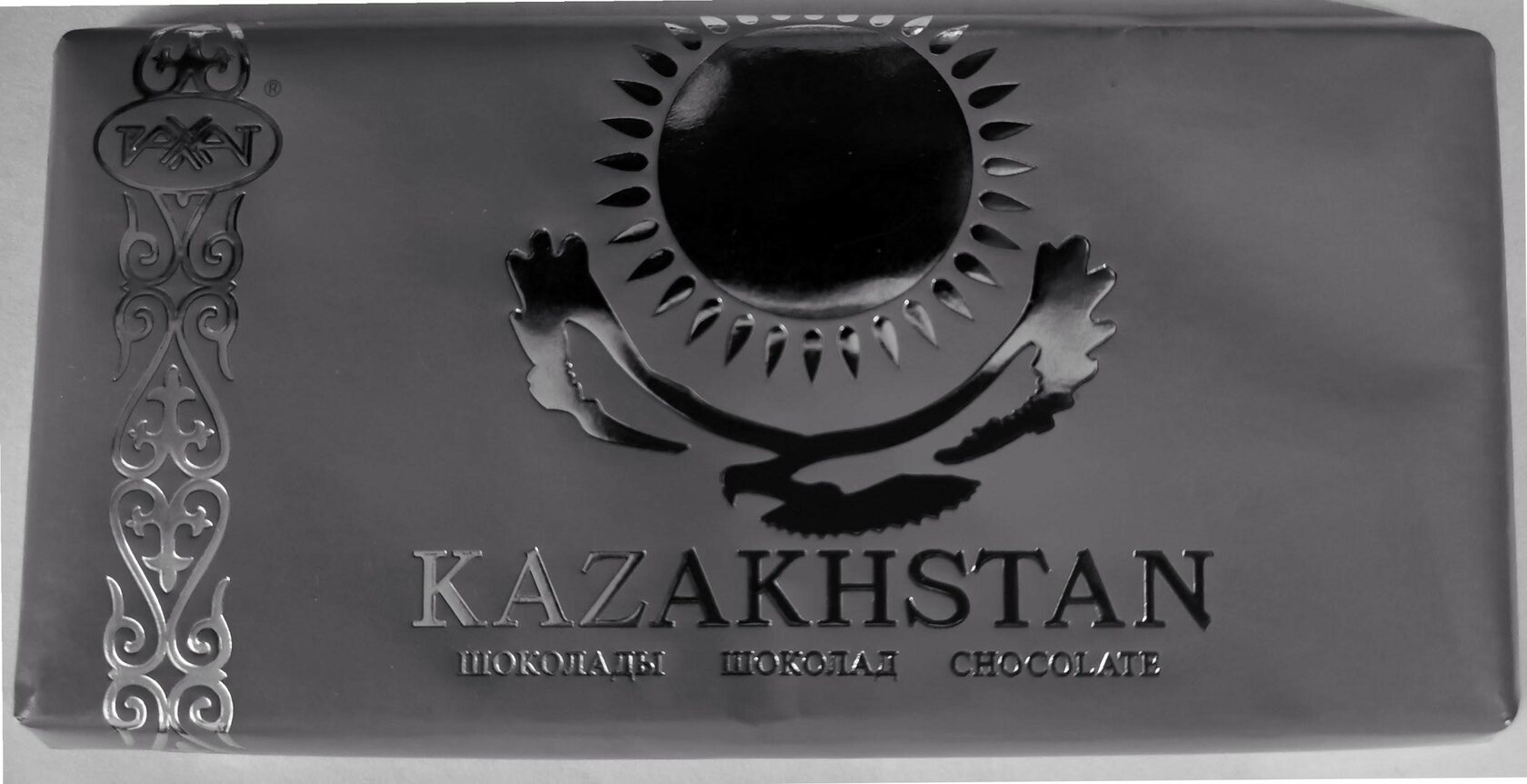
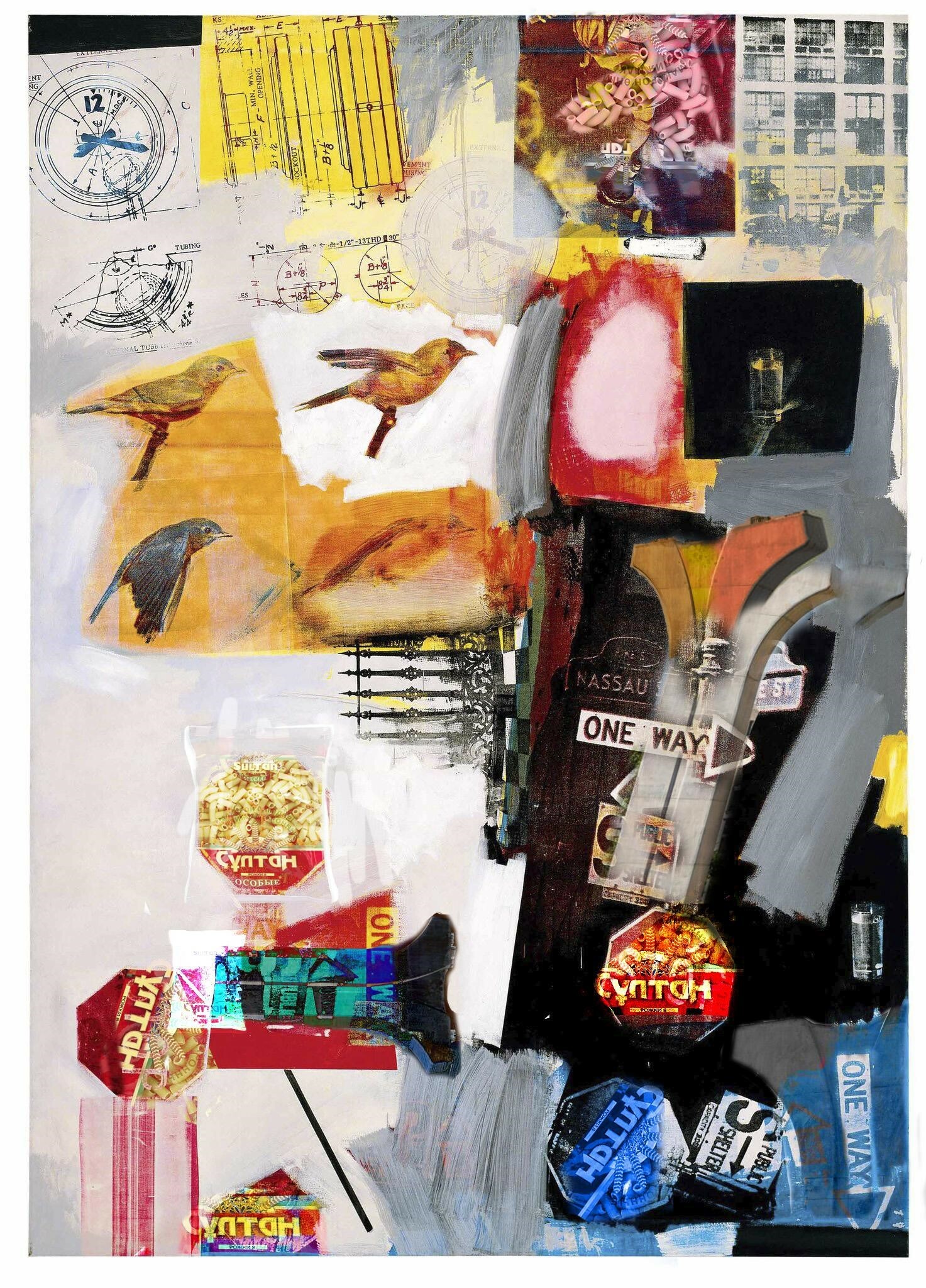
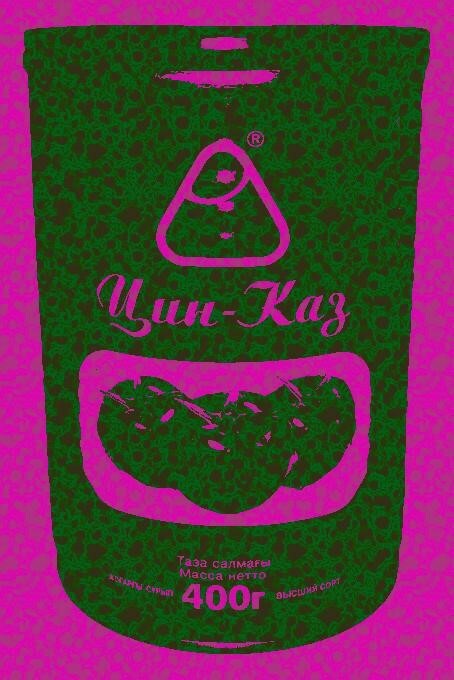
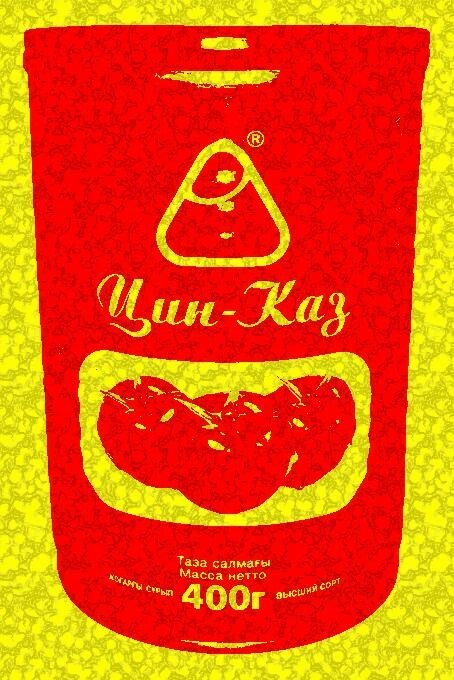


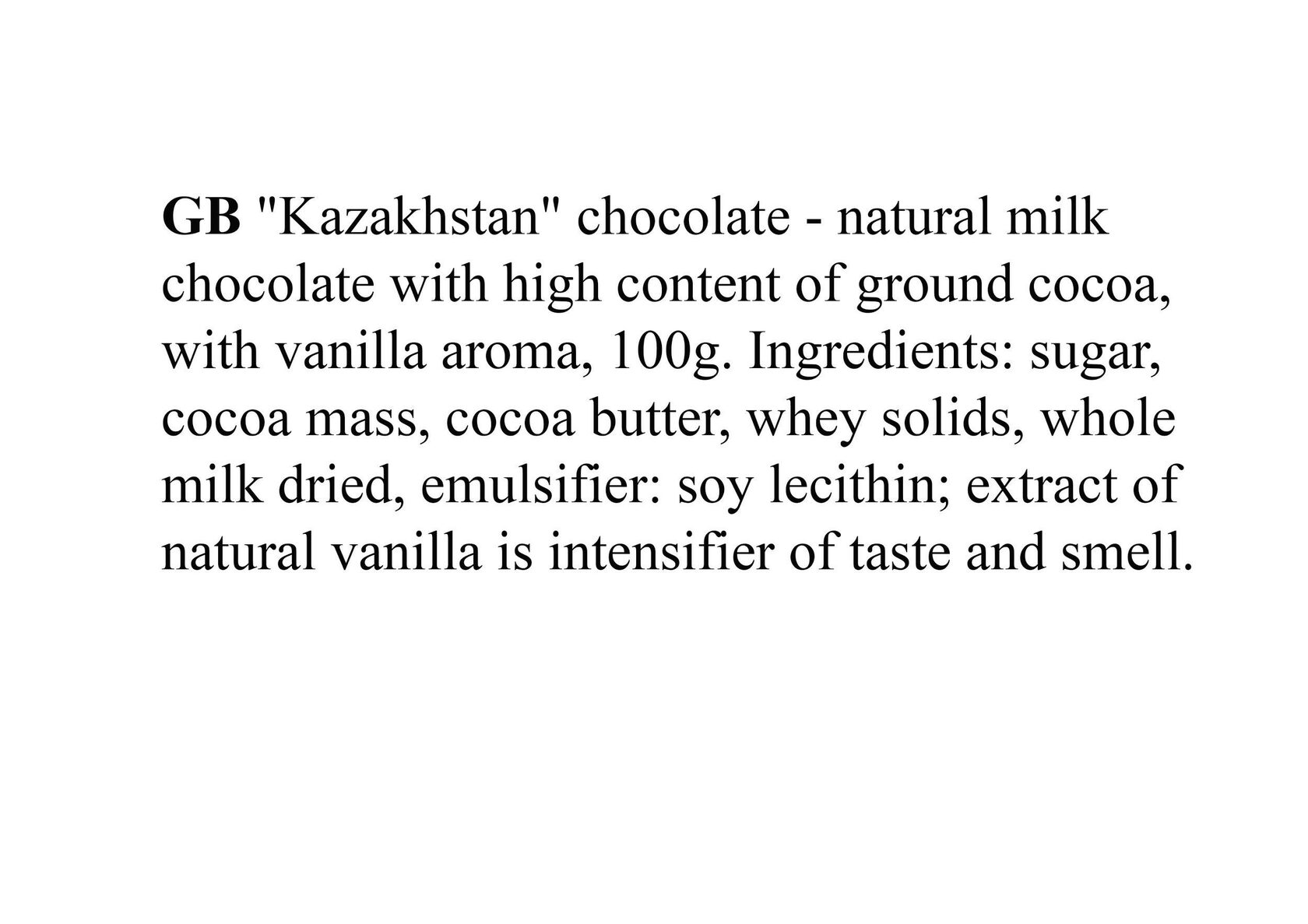
Three different homages for three famous works by a conceptualist Joseph Kosuth and pop art artists Robert Rauschenberg and Andy Warhol. The adaptation of their visual language into the regional context happens through local materials and meanings that Gafurova picked up. So, One and Three Chairs by Kosuth become Kazakh chocolate, Campbell's Soup Cans by Warhol turns into a can of Tsin-Kaz tomato paste, and Rauschenberg's Overdrive applies the iconography of Sultan pasta.
Balnura Nusipova
Dostarkhan, 2019
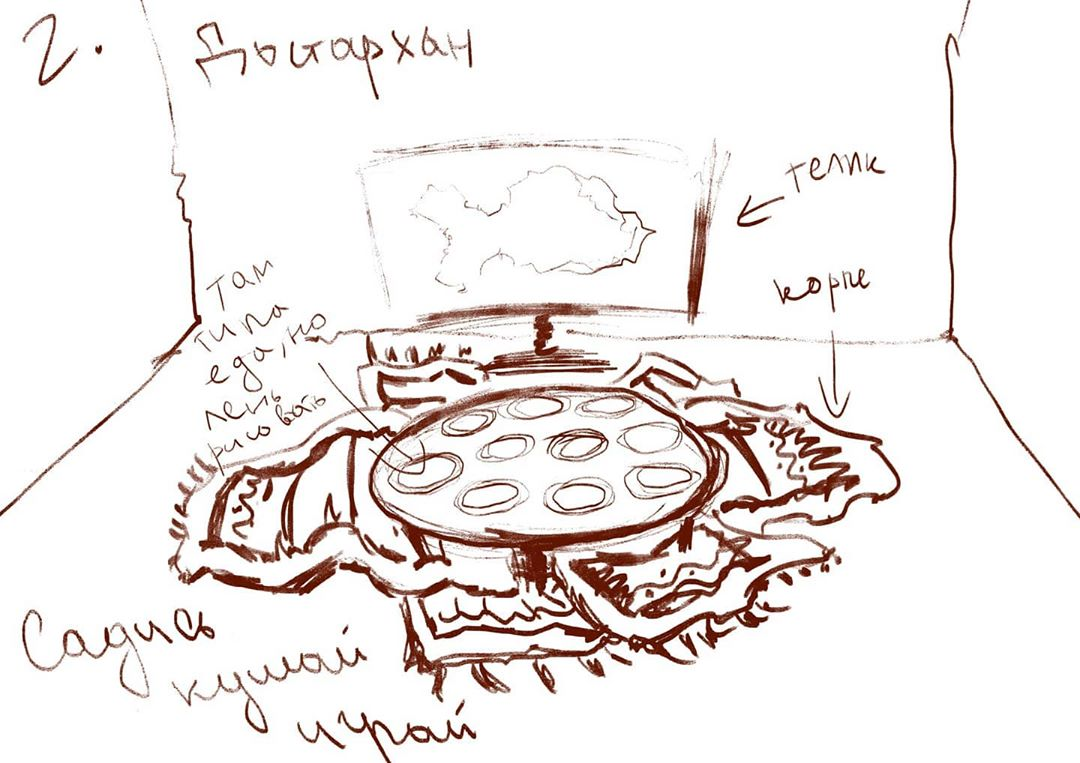
Interactive installation, motion sensors, projector, ceramics, wood
Dimension variable, table diameter 110 cm
Dimension variable, table diameter 110 cm
Korean salad, potato pancakes, meat jelly, baursaki and all other types of food become not just food, but also a means of interaction between different people. Anyone can become a part of the work - it is interactive. If you want it – you can eat it, and play the music in contact with the plates with national dishes. Each of them depicts a place on the map of Kazakhstan with those peoples who live here and whose dish is touched by the viewer.
Aida Adilbek
Violator vol.2, 2020
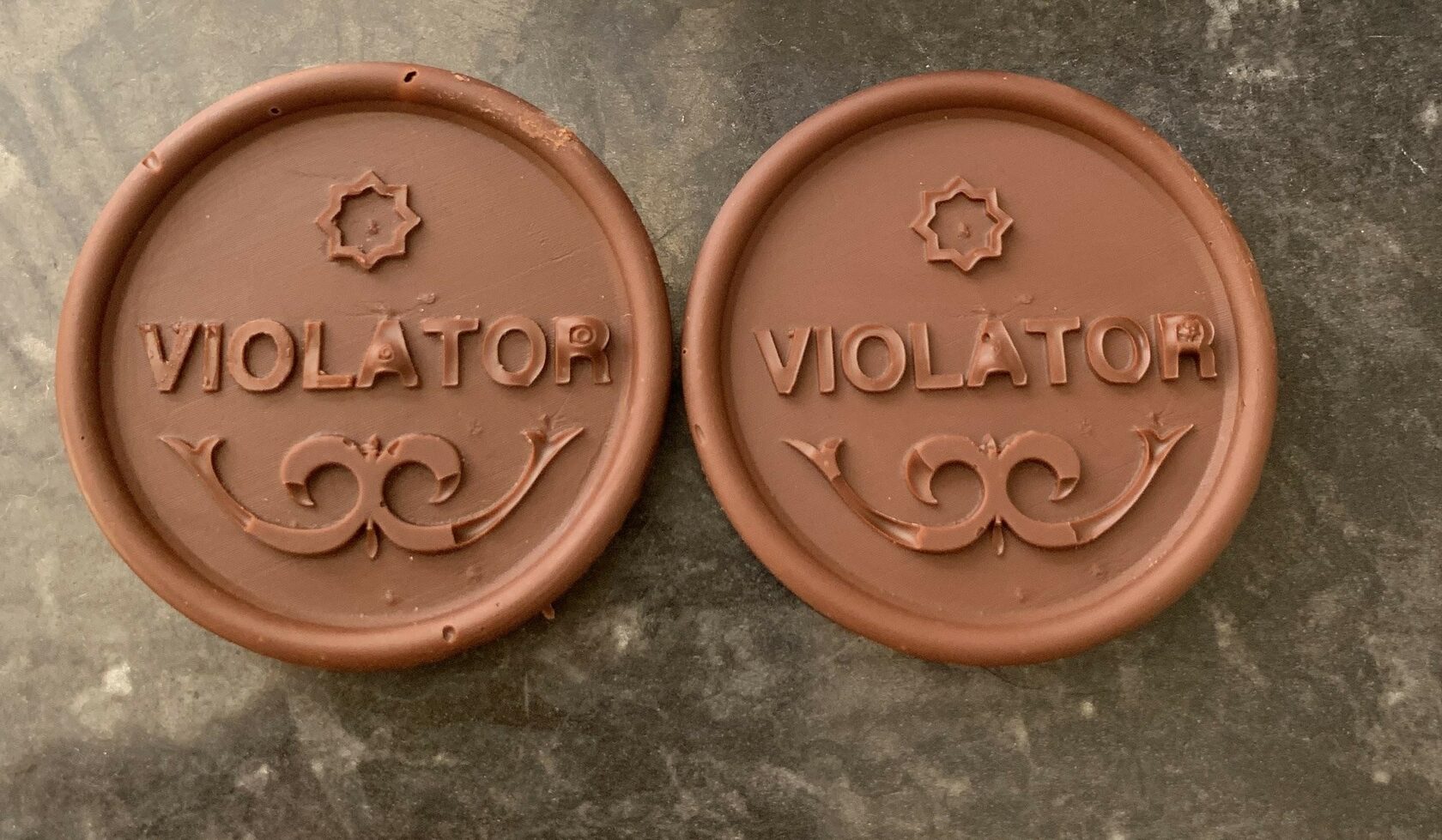
100 chocolate coins with diameter of 5 cm
The work is an extension of the Violator project, where Adilbek wonders what the word 'violator' means in the current times of Kazakhstan and the whole world. Now for 'violation' of several rules you can get a very significant kind of restriction, while for other violations you will not bear any responsibility and live on quite happily. The inconsistency of today's world leads to the conclusion that we are all violators and we are all winners.
Muratbek Turbay
2020, 2020
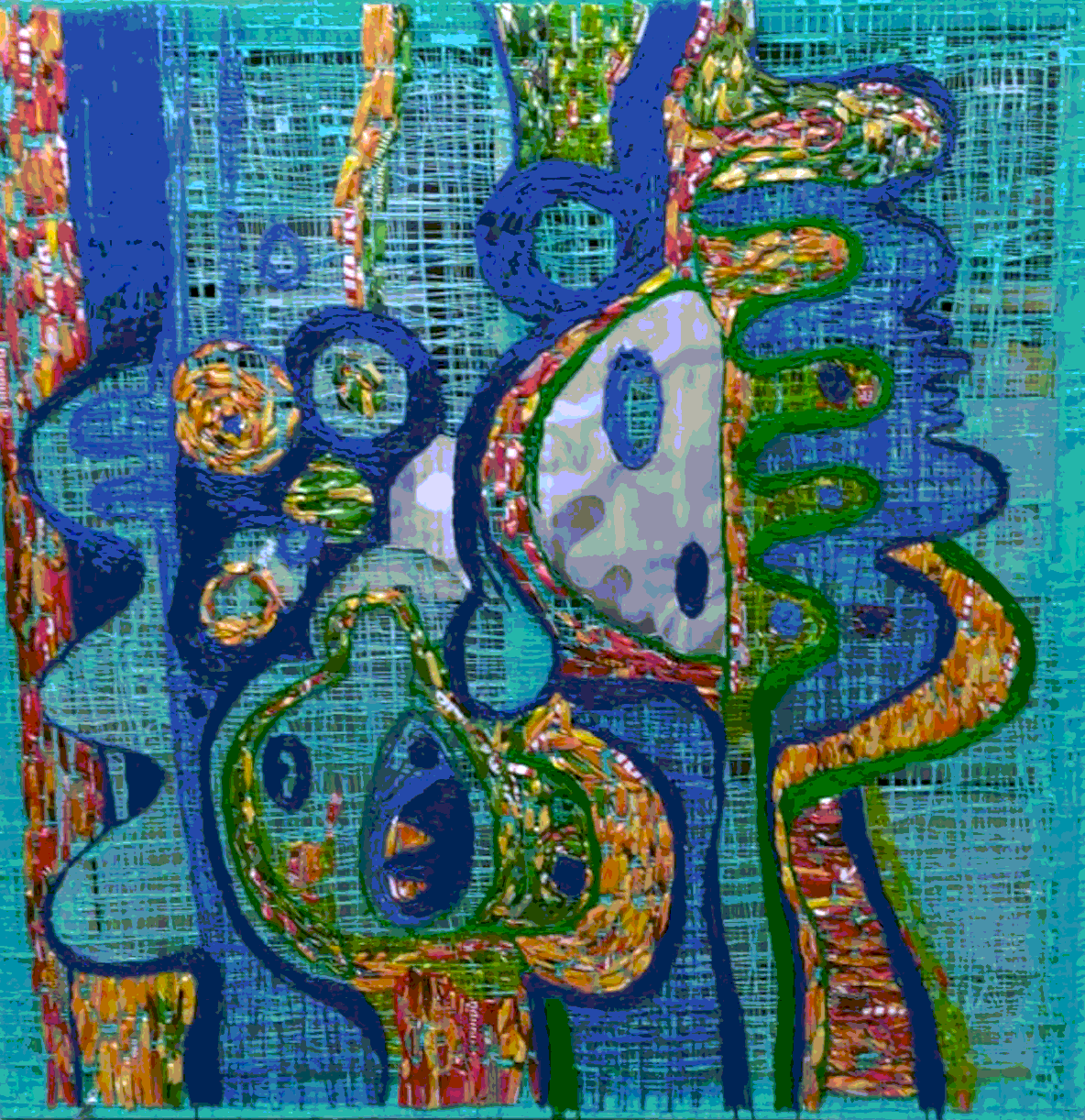
embroidery from threads made from packages from chips, polyethylene, instant breakfasts packaging
100 х 100 cm
100 х 100 cm
In everyday life we are faced with a huge amount of polyethylene waste. A young artist Muratbek thinks about aesthetic ways of recycling this material and cuts plastic packaging into separate long threads to weave them in a bright collage.
Daria Temirkhan
Zengi Baba, 2020
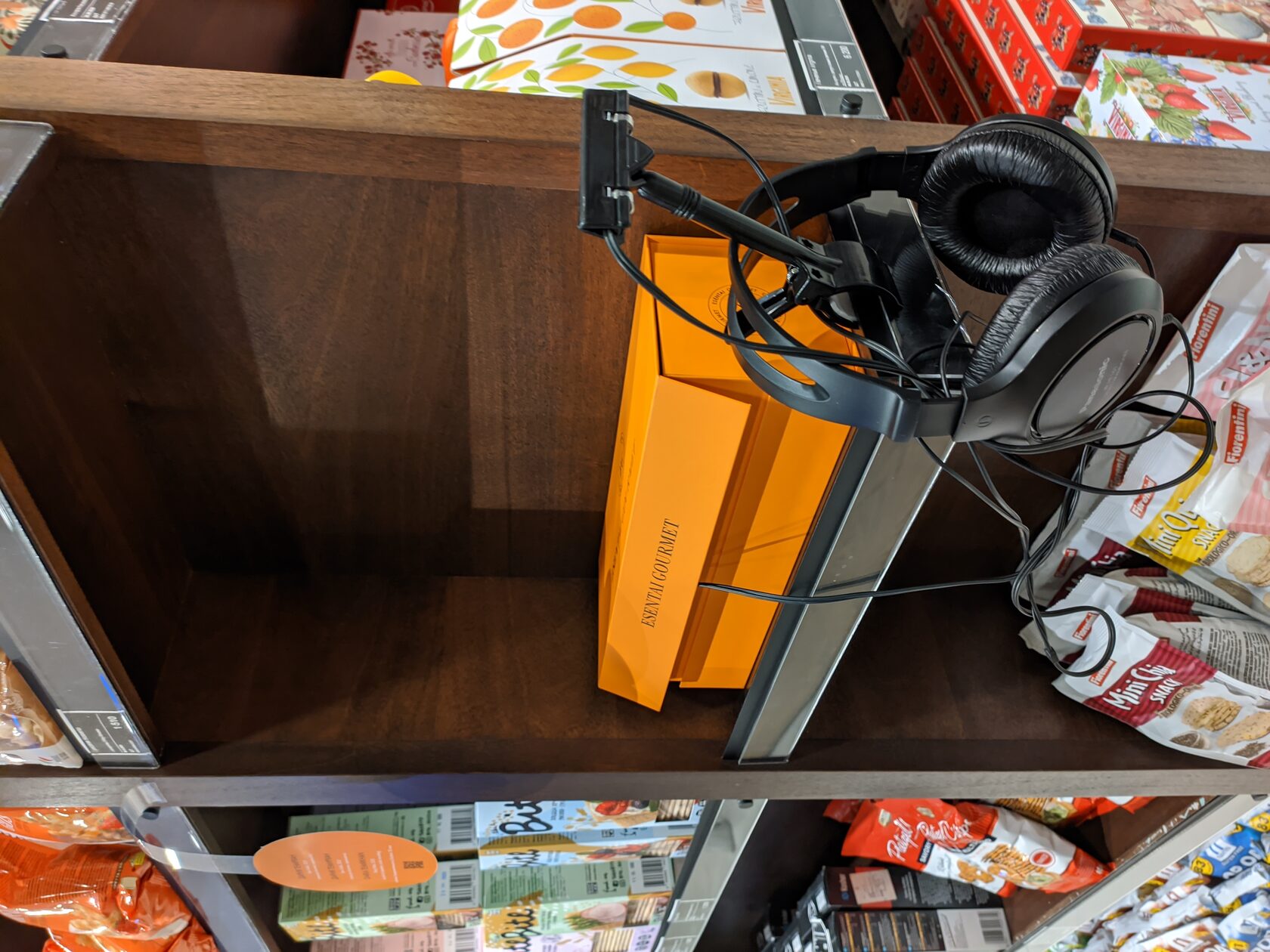
soundart
To answer the question of whether the four spirits live in the modern world.
What would have happened if the spirits of animals existed in our time? This is a work on verbal traditions and its adaptation to the post-Internet era. What will happen if we move the spirits in the digital space, and they continue their way of life? According to the legends Zengi Baba sang zikr after the evening prayer. It is the story Temirkhan revives again in the meat department of the supermarket, preliminarily singing his zikr and recording it as an audio track. In order to cross the line between the legend and the present people buying food are reminded about the guardians of animals with a secret hope that we will once again think about conscious consumption.
What would have happened if the spirits of animals existed in our time? This is a work on verbal traditions and its adaptation to the post-Internet era. What will happen if we move the spirits in the digital space, and they continue their way of life? According to the legends Zengi Baba sang zikr after the evening prayer. It is the story Temirkhan revives again in the meat department of the supermarket, preliminarily singing his zikr and recording it as an audio track. In order to cross the line between the legend and the present people buying food are reminded about the guardians of animals with a secret hope that we will once again think about conscious consumption.
Fatima Omir
"Chi" World Unity 2020, 2020
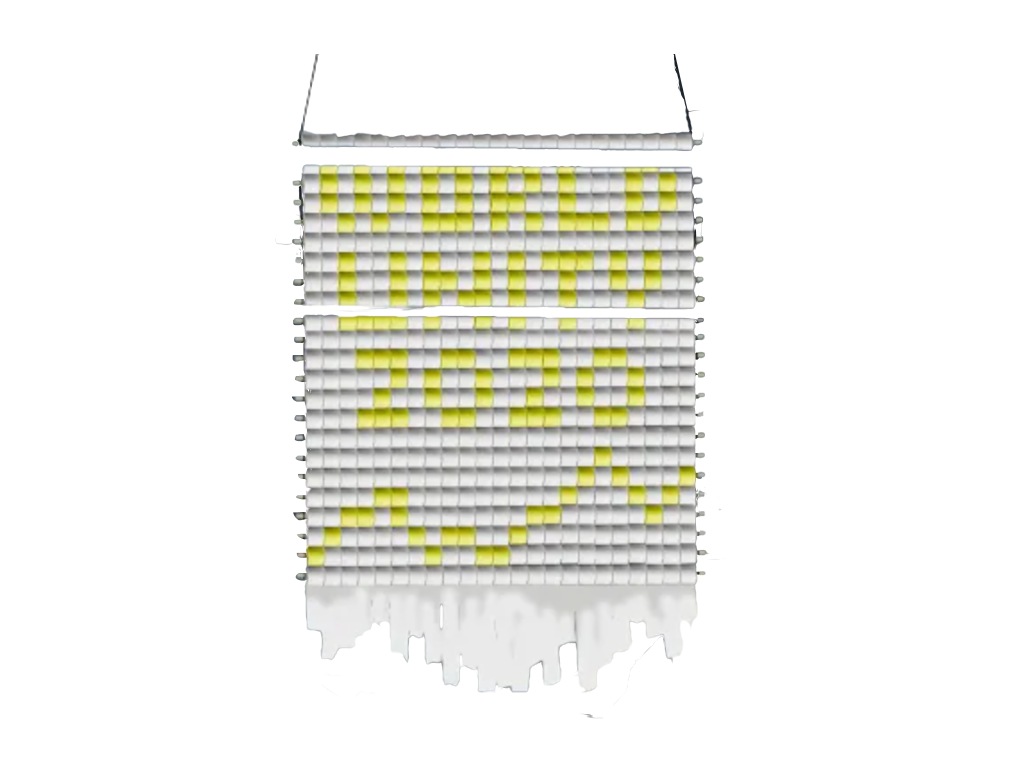
plastic pipes, toilet paper, mats
3 х 4 m
3 х 4 m
The pandemic isolated people and countries from each other, but united the planet through sensitive involvement and emotional experience. An unutterable melancholy fell on the world, both at the macro level - on the scale of states, and at the micro level – on each individual person.
A mat made of toilet paper rolls invites the audience to feeling calmness and unification in the same strange and absurd way as it was through this entire year.
A mat made of toilet paper rolls invites the audience to feeling calmness and unification in the same strange and absurd way as it was through this entire year.
Balnura Nusipova | Bauyrzhan Sabitov
ALA, 2020
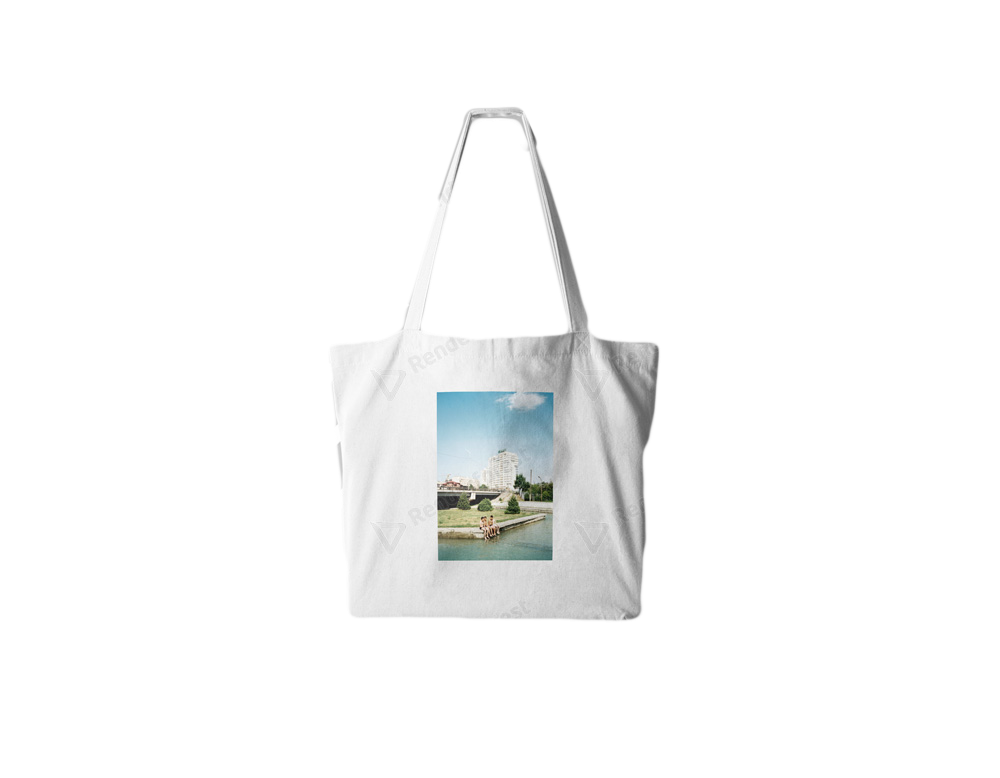
limited edition of unique shoppers with copyrighted photos
Art, design, fashion, architecture and even food are connected and interact with each other. This is a kind of thought process, due to which something physical appears from an idea; through trials and errors with skill and empirical experience something turns out either worse or better. Sabitov and Nusipova release a special series of shoppers with images of Almaty buildings and streets that encourage the city residents to use ecofriendly materials, avoid throwing out many plastic bags and being reminded what a beautiful city we live in.
Valery Ruppel
Political Botany / Tulip Revolution, 2006
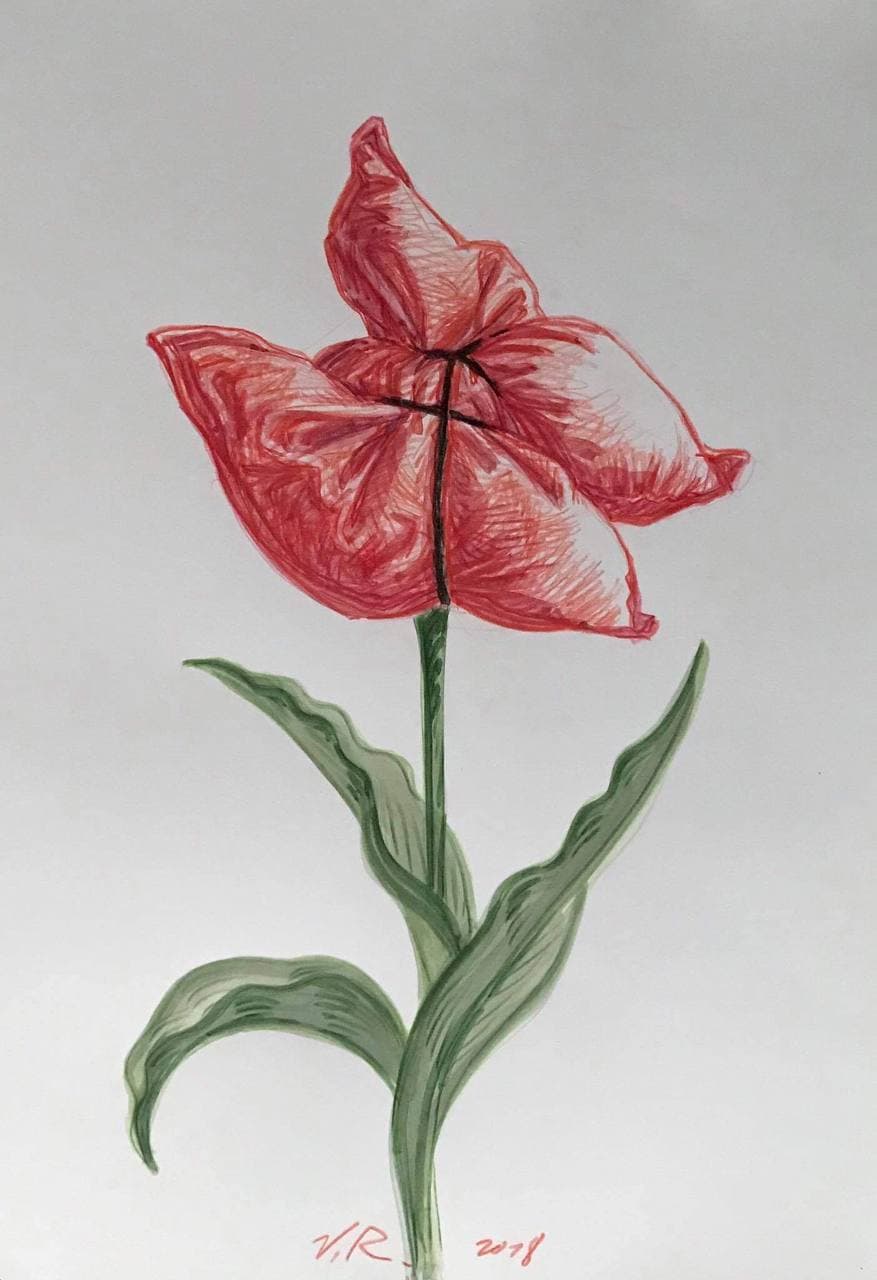
Pencil, A3 paper

The Political Botany / Tulip Revolution series of Valery Ruppel from Kyrgyzstan breed a new variety of post-revolutionary tulips. The series explores the physical and metaphysical transformations that have happened to the society and every single flower in this garden.
Ulan Djaparov
Nan-Ursyn, 2007
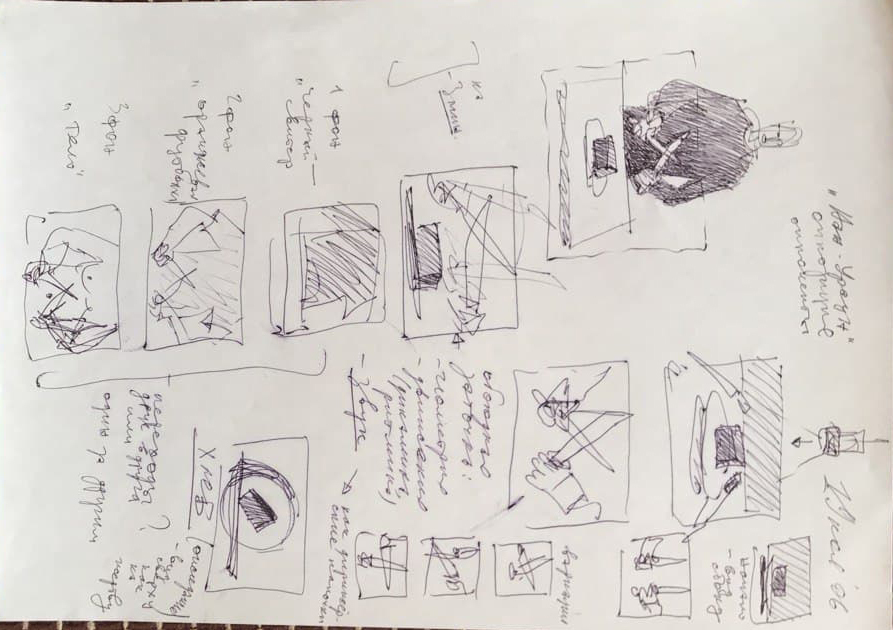
Working sketch of Nan-Ursyn performance
A4 paper, gel pen
A4 paper, gel pen
A working sketch of Nan-Ursun, a landmark performance by the artist from Kyrgyzstan, which was carried out in 2007 within the framework of the Rest Zone project (curated by O.Shatalova and T.Ogobaev).
PERFORMANCES
PERFORMANCES
PERFORMANCES
PERFORMANCES
PERFORMANCES
PERFORMANCES
Bakhyt Bubikanova
The Sower, 2020
Bananas, safety clothing
duration: 40 min
duration: 40 min
The pandemic had a major impact on the leisure time industry, where culture is a significant part. Suddenly the society began to exist somewhat parallel to cultural processes. On the other hand, a lot of bad and meaningless things have gone, but this is a visible delusion, because the battle between good and evil is never over. Based on the concept that you sow is what you reap, on the area of the supermarket the artist sows not stocks-and-bonds, but banana peels. It seems that there is nothing wrong with banana peel, it is even used as fertilizer, but the soil is inconvenient, and the results and consequences are also different.
Katya Dzvonik, LITERAL ACTION Inclusive Theater Lab
Babylonian Shopping, 2020
duration: 40 min
In this project we are trying to erase the boundary between 'common' and 'uncommon' people and give them space and an opportunity for meeting and dialogue - in the location of a supermarket. For example, a trip to grocery store is often a routine for neurotypical persons, and for a person with mental disabilities it becomes a kind of 'quest', an adventure that he/she often cannot experience on his/her own. Many special artists of the Literal Action lab have never been unaccompanied in the store and do not know how to navigate among the grocery shelves.
Therefore, we invite viewers and our special artists to spend some time together – to go 'Babylonian shopping' in order to actually meet and see the "other" person, try to find contact and create a special micro-world at least for a short period of time. In such world communication and ordinary daily affairs acquire a special clarity and become a part of the performance art.
Therefore, we invite viewers and our special artists to spend some time together – to go 'Babylonian shopping' in order to actually meet and see the "other" person, try to find contact and create a special micro-world at least for a short period of time. In such world communication and ordinary daily affairs acquire a special clarity and become a part of the performance art.





















































